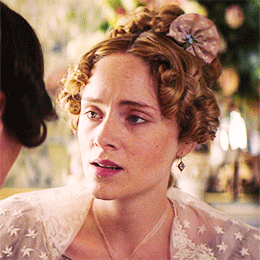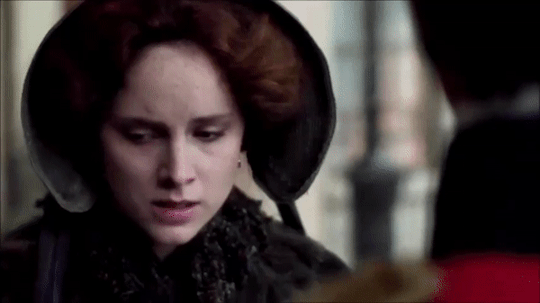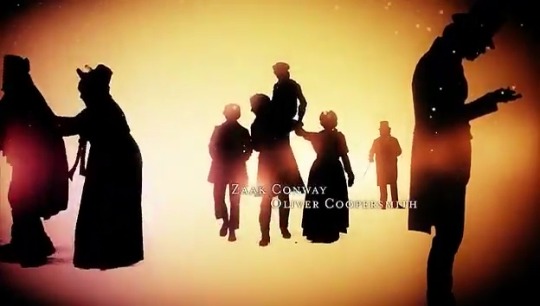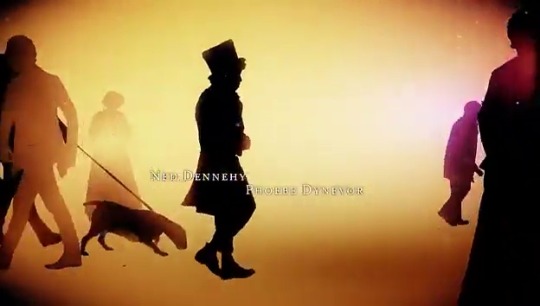#Honoria Barbary
Text
Did I watch Dickensian for Joseph and my love of Charles Dickens? Yes I did. But did I end up absolutely loving several other characters and being absolutely enamored by their acting? Oh god yes. I loved it everyone is incredible in it.
#dickensian#arthur havisham#amelia havisham#honoria barbary#they were incredible characters through the whole series#joeseph quinn#tuppence middleton#sophie rundle
20 notes
·
View notes
Text
Dickensian: Honoria Barbary [ISFP 9w1]
Dickensian: Honoria Barbary [ISFP 9w1]
MBTI Type: ISFP
Honoria wants to pursue her feelings for the man she loves above all else, even ignoring the practicality of having fallen in love with someone with no fortune or ability to help her family out of their dire straits. She follows her affections right into his bed and winds up pregnant, but not ashamed of it. Though she knows it would be better to conceal this, after she thinks she…

View On WordPress
3 notes
·
View notes
Text
Okay, I'm obviously becoming obsessed with Tysan as I thought of a Bleak House inspired story last night after re-watching the 2005 adaptation that stars Charles Dance. There were several roles that Sansa could be, Esther Summerson, Ada Claire, but I settled on Lady Deadlock, - who was played by the excellent Gillian Anderson - as it gave me a chance to change her tragic end, although the story I have come up with shifts the time line to twenty years before the start of Bleak House.
Incidentally Gillian Anderson turned down Game of Thrones, which I would have loved to have seen her in.
Plot: Sir Leciester Deadlock - names to be changed when finished - has died, leaving his vast estate to his wife of six months, Sansa - Honoria Barbary.
His lawyer, Josiah Tulkinghorn - Tywin Lanister, - travels to Chesney Wold to assure Lady Deadlock of his loyalty to her late husband and his desire to continue to manage the estate. Until now he has never met her. He finds himself intrigued by her beauty, intelligence and poise. Despite himself, he becomes interested in her.
There was a codicil in Sir Leciester's will which takes care of a secret that his wife had, a daughter born out of wedlock, from a liaison with an officer of the army, who left for India - Essos - after spending one night with her. Sir Leicester had promised to bring the child to Chesney Wold and raise her as his heir, a task which is now in Tywin's hands.
And of course there is the matter of Jarndyce v Jarndyce, in the Chancery court, in which Lady Deadlock has a slight interest, though she expects, like Tywin, that by the time the case is resolved, the whole Jarndyce estate will be swallowed up by costs.
0 notes
Text
#women-crush-wednesday
Week 7: Sophie Rundle



#sophie rundle#great expectations#Clara#an inspector calls#merlin#sefa#call the midwife#Pamela saint#dickensian#Honoria Barbary#peaky blinders#ada shelby#jamestown#Alice Kett#Silas Sharrow#bodyguard#Vicky budd#gentleman jack#ann walker#the nest#Emily
85 notes
·
View notes
Photo






sophie rundle really is the queen of period dramas
#sophie rundle#hbo#bbc#gentleman jack#ann walker#the bletchley circle#lucy#peaky blinders#ada shelby#the inspector calls#dickensian#honoria barbary#call the midwife#pamela saint#historical dramas#period dramas#there are only 3 british actors#eva smith
762 notes
·
View notes
Photo

Sophie Rundle as Honoria Barbary in Dickensian (2016)
45 notes
·
View notes
Text
Frances Barbary #1


Imagine...
Being unable to sleep after the past nights events. Honoria feeling scared and waiting for a man that never came. Only to give birth to a stillborn, at least at the time this was what the three girls assumed in the dark candlelit room. Y/N rushed to comfort her elder sister knowing Frances could do nothing but deal with the horror before them. Over the next couple of hours as the dark haired girl stood at the window, she could have sworn that the tiny cries of a baby were heard washing over the corridors and rooms of the home. But alas this must be false, the pale girl saw the seemingly perfect babe with her own two eyes.... dead never to take that first breath. The sudden opening of the front door drew her attention on to the dirty street below. Maybe it was the lack of sleep or the hysteria that had been present in the building not hours earlier. She could have sworn like a sailor she was tired yes! But blind to the poisonous creature she sadly had to claim as her eldest Sister Frances No! The figure rushed away from the door step but oh oh there was most definitely a babe in her arms. How could she! The good Christian woman who often judged others for 'ungodly acts' lied yet again to the middle Barbary girl and she expected to get away with no consequences - when she had quite literally stolen a babe from the arms of a loving Mother. This was a secret Frances would have to take to the grave, one monstrous act had teared apart their family and this time no matter what the youngest Barbary would not forgive..... NEVER.
Gif Source
Giphy.com
@chemicalcantatio
#gothicwidow#netflix imagines#netflix tv#dickensions imagines#dickensions#charles dickens imagines#barbary x reader#honoria barbary#frances barbary#imagines#au imagines#gif imagines#british tv#british imagines#bbc imagines#victorian imagines#victorian#charles dickens inspired#british
10 notes
·
View notes
Photo


‘‘I will do something, anything. I will beg, borrow, steal - sell my soul if I have to - but I can’t lose you. Ask anything of me and I will not flinch, but not that. Don’t ask that of me.’’
#dickensian#honoria barbary#captain james#james hawdon#nemo#bleak house#sophie rundle#gifs: mine#janoria#??#ep. 11
14 notes
·
View notes
Conversation
Honoria: You're so embarrassing.
James: Let go of my hand then.
Honoria: No.
15 notes
·
View notes
Text




Sophie Rundle as Honoria Barbary (the future Lady Dedlock) and Ben Starr as Captain James Hawdon (the future Nemo) in Dickensian (2015).
16 notes
·
View notes
Photo










Dickensian - BBC One - December 26, 2015 - February 21, 2016
Drama (20 episodes)
Running Time: 30 minutes - 50 minutes last episode
Stars:
Peter Firth as Jacob Marley
Joseph Quinn as Arthur Havisham
Tuppence Middleton as Amelia Havisham
Sophie Rundle as Honoria Barbary
Alexandra Moen as Frances Barbary
Tom Weston-Jones as Meriwether Compeyson
Robert Wilfort as Bob Cratchit
Ned Dennehy as Ebenezer Scrooge
Mark Stanley as Bill Sikes
Brenock O'Connor as Peter Cratchit
Karl Johnson as Grandfather
Adrian Rawlins as Edward Barbary
Bethany Muir as Nancy
Anton Lesser as Fagin
Ben Starr as Captain James Hawdon
Phoebe Dynevor as Martha Cratchit
Oliver Coopersmith as John Bagnet
Imogen Faires as Nell
Jennifer Hennessy as Emily Cratchit
Christopher Fairbank as Silas Wegg
John Heffernan as Jaggers
Richard Ridings as Mr Bumble
Caroline Quentin as Mrs Bumble
Zaak Conway as Tiny Tim Cratchit
Pauline Collins as Mrs Gamp
Benjamin Campbell as Boy
Laurel Jordan as Daisy
Ellie Haddington as Fanny Biggetywitch
Stephen Rea as Inspector Bucket
Omid Djalili as Mr Venus
Amy Dunn as Mary
Ukwell Roach as Sergeant George
Richard Cordery as Sir Leicester Dedlock
Neil Findlander as Desk Sergeant
Sam Hoare as Matthew Pocket
Jack Shalloo as Constable Duff
Wilson Radjou-Pujalte as Dodger
Richard Durden as Thomas Gradgrind
Antonia Bernath as Sally Compeyson
Leonardo Dickens as Oliver Twist
Stuart McQuarrie as Reverend Chadband
Richard Cunningham as Reverend Crisparkle
Mike Burnside as Major Bagstock
Paul Lancaster as Lowten
14 notes
·
View notes
Text
So, at 5am this morning in the throes of insomnia, I had an idea for a Bleak House fanfic. As you do. Because man, it’s depressing, and I like making things happy.
The idea is insanely long and convoluted, much like Bleak House itself, and I shall likely never ever write it, but I wanted to get the idea down anyway.
So voila! Worry’s Bleak House idea. It is 300% more queer and, unfortunately, 1000% more historically inaccurate.
Under the cut because it’s so ridiculously long. Apparently, my brain likes to be detailed when I can’t sleep.
So! We begin way way back before the book/ TV series begins. Please note I’m working primarily from the 2005 TV series.
Honoria Barbary finds out she’s pregnant. James Hawdon is MIA likely dead. The only other person who knows about the pregnancy is her sister Frances, who Does Not Approve.
Honoria decides, in the wisdom of blind panic, to run away, eventually making her way to Bleak House. The Jarndyce family are acquainted with the Barbarys (John Jarndyce is friends with Frances through Lawrence Boythorn but was never as close to Honoria).
I’m not sure on canon timelines, but this is all happening circa 20 years prior to canon beginning, going from Esther’s canon age. Anyway, John Jarndyce has yet to inherit Bleak House from his uncle, and the place stands mostly empty, with just a skeleton staff keeping it looked after, since Uncle Jarndyce spends most of his time in London obsessing over the Jarndyce & Jarndyce chancery case.
The housekeeper takes pity on Honoria - who is passing herself off as a young widow and calling herself Mrs Hawdon - and takes her in, giving her bed and board in exchange for working in the kitchen. This poses something of a problem as a) Honoria is having a difficult pregnancy and isn’t in the best of health having run away, and b) she’s an upper class lady and hasn’t done a day’s work in her life. The housekeeper (let’s call her Mrs Potts), quickly recognises this and reluctantly, Honoria shares her full story. Mrs P, being a kindly soul, agrees to keep the secret.
Time passes. Esther is born. Frances believes that the disappeared-without-trace Honoria is likely dead by now; since she does not have to care for Esther, she marries Lawrence Boythorn. Uncle Jarndyce commits suicide and John Jarndyce inherits Bleak House, returning there and intending to make it his primary residence.
Honoria, who knows John and knows he’ll recognise her, has another mad panic moment, but manages to avoid running away since she has a child to look after now. Mrs P attempts to hide her from John as best she can, but ultimately, the truth outs. John is shocked to say the least (he’d been told Honoria had died after a sudden illness), but nonetheless agrees to keep her secret and promises not to tell Frances.
Time passes. Honoria works her way up through the household and takes over from Mrs P as housekeeper when the latter retires. John pays for Esther’s education with a view to her becoming a governess, but the best laid plans of mice and men and all that, because there are Plot Points at work here.
Namely, the one (1) scene that we got of Honoria and John interacting in the TV series made me ship them.
John and Honoria get closer and eventually marry, and a few months later John becomes guardian to Richard and Ada. Esther, now John’s stepdaughter, becomes Ada’s companion and the two ladies begin to fall for each other.
Whilst this is going on, Honoria finds out that James may indeed still be alive after recognising his handwriting on legal documents like in canon. (Tulkinghorn and Kenge both use Snagsby as a stationer so it’s perfectly plausible that James could have copied papers for Kenge which end up with John and Honoria sees them that way, as opposed to copying papers for Tulkinghorn that then go to Sir Leicester that she sees as in canon. I do sometimes think things through properly...) However, unlike in canon, since John knows about her past relationship with James, there’s no subterfuge going on and they set out to see if they can find him, figuring that Esther deserves to know her birth father if nothing else.
Off they all go to London - Richard’s supposed to be starting to study medicine there anyway - where who should enter the scene but Allan Woodcourt. He helps them find James, thankfully before he carks it this time, and Oh God THE ANGST.
Ahem.
Richard stays in London and Allan promises to keep an eye on him and be a friend. Naturally, as these things are wont to do and because I generally always end up pairing the spares, Allan ends up as a bit more than a friend.
Meanwhile, we’re back to Bleak House, where James is being nursed back to health by Honoria, both of them in a rather delicate mental state since each thought the other one dead for nigh-on twenty years, and there’s the small fact that Honoria is married and genuinely loves her husband, but James is the first love she’s never forgotten and the father of her child.
(Ada and Esther are still going strong in the background, by the way. Everyone in the house is pretending they’re just gal pals.)
John offers James a position as his secretary once he’s recovered, and tells Honoria (in slightly more delicate language than me) that if she and James want to have an affair, he’ll turn a blind eye as long as they’re discreet about it.
Honoria isn’t exactly happy about this because she loves both of them, and in the end, after much angst and many conversations, a tentative but successful polyamorous relationship between the three commences.
Back to Ada and Esther and Rick and Allan. This being Dickensian times, they’re not exactly on the best footing for having proper relationships, but taking a leaf out of Honoria, John and James’s book, they decide that marriage is the way forward. Ada and Richard marry, as do Esther and Allan, and they end up living very close by to each other, allowing both ‘forbidden’ relationships to continue undisturbed. (Although interestingly, female homosexuality was never technically illegal in Victorian times because Queen Victoria didn’t believe it was possible and scratched out all mention of it in the bill that made male homosexuality illegal.)
And there we have it. It took me over an hour to type that, God help me if I do decide to write the blessed thing...
#Worryingly writes#sort of#Worryingly has epic ideas for Dickens fanfic at 5am and just runs with them
11 notes
·
View notes
Text
Yuletide self-pimpage post
I’ve barely had time to read my way through this year’s collection, but now that authors have revealed, I can at least link to the two fics I wrote. :)
The Kindness of Strangers (Dickensian, BBC)
Characters: Honoria Barbary, Nancy
Rating: Teen
Content notes/warnings: Rated for discussion of sex and prostitution, and Victorian attitudes thereto.
Word count: 4449
Summary: Society may not allow any point of similarity between a gentleman's daughter and a working girl, but a chance encounter gives Honoria Barbary and Nancy a chance to discover some common ground.
Through Bitter Waters (’Salem’s Lot - Stephen King)
Pairing: Ben Mears/Mark Petrie
Rating: Explicit
Content notes/warnings: NSFW; underage sex; pairing with an age difference. (Specifically: Mark is sixteen in the timeframe of the fic. Ben is in his thirties, and in a position of trust. Consider yourself warned.) Also some horror imagery, because vampires.
Word count: 6459
Summary: Three years after finishing with the Lot, the darkness finds them again. But Mark isn’t a child any more, and he has no innocence left to lose.
3 notes
·
View notes
Text
Life After Life
read it on the AO3 at https://ift.tt/2E9xown
by kmo
Four times Hannibal dreamed of sharing another life with Bedelia and one time she dreamed of him.
Words: 2294, Chapters: 1/1, Language: English
Fandoms: Hannibal (TV), Bleak House - Charles Dickens, A Streetcar Named Desire - Tennessee Williams, Any Human Heart, Coco Chanel & Igor Stravinsky (2009), The Fall (TV 2013), A Royal Affair (2012)
Rating: Teen And Up Audiences
Warnings: No Archive Warnings Apply
Categories: F/M
Characters: Bedelia Du Maurier, Hannibal Lecter, Honoria Barbary | Lady Dedlock, Blanche DuBois, Igor Stravinsky, Wallis Simpson, Stella Gibson, Johann Struensee
Relationships: Bedelia Du Maurier/Hannibal Lecter, Bedelia Du Maurier & Hannibal Lecter, Lady Dedlock/Hannibal Lecter, Blanche DuBois/Hannibal Lecter, Igor Stravinsky/Wallis Simpson, Stella Gibson & Hannibal Lecter, Johann Struensee/Bedelia Du Maurier
Additional Tags: Crossover, Just A Dream, Or Is It?, hannibal expanded universe, 4 + 1 fic
read it on the AO3 at https://ift.tt/2E9xown
0 notes
Photo

Sophie Rundle as Honoria Barabry in Dickensian (2015)
22 notes
·
View notes
Photo

HISTORIA UNIVERSAL - EL REY TEODOREDO -
Teodoredo, llamado por algunos como San Agustín, o Teodorico I, sucesor de Walia, se sintió desligado del pacto que éste suscribió con Roma e intentó ampliar sus dominios galos. En los primeros años de su Reinado, los vándalos, tras ser derrotados por Walia, buscaron refugio entre los suevos de Galicia, se levantaron contra los que les ofrecieron hospitalidad; pero fueron rechazados y obligados a regresar a su anterior territorio de la Bética.
Llevados por su espíritu de destrucción, asolaron las costas valencianas, saqueando y destruyendo Cartagena y pirateando por las Islas Baleares, pero un acontecimiento inesperado iba a librar a la Bética de semejantes depredadores. En el año 426 falleció el Emperador Honorio, sucediéndole Valentiniano III, un niño de seis años.
Hijo de Gala Placidia, viuda de Ataúlfo y de Constancio, su cuñado Honorio que no tuvo hijos lo elevó a la categoría de Augusto y Corregente en 421. Gala Placidia, tras la muerte de su esposo Constancio que solo Reinó siete meses con el nombre de Constancio III, asumió la Regencia. Pronto empezaron las intrigas y las ambiciones de poderosos rivales. Juan, alto funcionario real, tomó la púrpura en Roma, pero no se pudo mantener. Teodosio II, Emperador de Oriente apoyó a Gala Placidia con un importante Ejército.
El General Aecio era un semibárbaro, cuyo padre, Gaudentius, nacido en Escitia, había desempeñado el cargo de magister. Aecio, que en su juventud fue rehén de los hunos, y aún antes partidario del usurpador Juan, para quien reclutó un Ejército de hunos, era ahora, Consejero y General Valentiniano III. Bonifacio, Gobernador de África, se mantuvo fiel a Valentiniano III, pero su soberbia obligó a Gala Placidia, inducida por Aecio, a tomar medidas militares contra Bonifacio, quien, para defenderse de los ataques romanos, adoptó una grave resolución: llamó en su ayuda a los vándalos de la Bética, que acudieron, con su Rey Genserico a la cabeza.
El historiador Jordanes retrata a Genserico:
“Era de mediana estatura, cojo, a consecuencia de una caída de caballo; impenetrable en su pensamiento, parco de palabras, despreciador de la adulación, impetuoso en la ira, ansioso de riquezas, muy prudente y hábil para manejar a los pueblos y muy astuto para sembrar las semillas de las diferencias y el odio”.
Los vándalos, cargados con el rico botín producto de sus saqueos cruzaron el Estrecho de Gibraltar con sus mujeres e hijos en número de 80.000 en 428. Bonifacio tardó poco en arrepentirse de tomar esa rencorosa decisión. Los vándalos se apoderaron de toda la Mauritania, sitiaron Hipona, donde falleció San Agustín, tomaron Cartago y fundaron en África un Imperio que sólo la espada de Belisario, el General bizantino, pudo destruir posteriormente.
Mientras tanto, los visigodos, aprovechando estas luchas y deseosos de recobrar los territorios de la Galia que el difunto Honorio concedió a Ataúlfo, pusieron sitio a la ciudad de Arlés[3]. Aecio acudió rápidamente y obligó a Teodoredo a levantar el sitio y a retirarse a su capital, Tolosa. Visigodos y romanos vivieron entre la guerra y la paz durante algún tiempo, firmando tratados que los visigodos rompían poco después; pero Teodoredo seguía ensanchando sus dominios hacia el Loira y el Ródano.
Bonifacio hizo la paz con Rávena y Gala Placidia le nombró Generalísimo sustituyendo a Aecio, que acumuló un poder excesivo tras sus éxitos en las Galias contra los francos y los visigodos. La guerra estalló entre Aecio y Bonifacio que se enfrentaron en Rímini (Norte de Italia), venciendo Bonifacio, aunque fue herido de muerte. Aecio se refugió entre sus antiguos amigos, los hunos, regresando al frente de una horda de estos bárbaros.
La indefensa Gala Placidia tuvo que restablecerle en su antigua dignidad, con lo que Aecio se convirtió en el hombre más poderoso de Occidente, hasta que cayó cobardemente asesinado en 454 por la espada de Valentiniano III, que recelaba de los planes de este General omnipotente, siendo esta la única vez que el inepto Emperador desenvainaría su espada. Un año después, la venganza de los amigos de Aecio alcanzaba al Imperial asesino, que cayó víctima de conjura en el campo de Marte, en Roma.
Teodoredo, viendo a Aecio y a Bonifacio enfrentados entre sí, marchó sobre Narbona en 434. Litorio[4], el lugarteniente de Aecio en la Galia, que era pagano y simbolizaba las tradiciones de la Antigua Roma, rechazó a Teodoredo obligándole a encerrarse nuevamente en Tolosa. El visigodo la ofreció la paz y Litorio, orgulloso, la rechazó.
Teodoredo entonces se decidió a exponerse a un nuevo enfrentamiento en el que los romanos sufrieron graves pérdidas, y el mismo Litorio perdió la vida. Tras esta victoria, los visigodos pudieron extender sus dominios hasta el Ródano, viéndose los romanos a pedir la paz por medio de Avito, prefecto pretoriano de las Galias.
Teodoredo, consecuente con la política antiromana que había adoptado, intento reforzar su posición mediante alianzas matrimoniales. Casó a una de sus hijas en 449 con Hunnerico, hijo del Rey vándalo Genserico, y a otra con el Rey suevo Requiario en el mismo año. Éste, convertido al Cristianismo, aunque no por ello abandonó sus costumbres bárbaras, decidió buscar esposa. Escogió el camino vasco-navarro, saqueando sus comarcas. Franqueando los Pirineos, llegó a Tolosa, donde asombró a los propios visigodos por su rudeza y salvajismo. El camino de regreso lo hizo por Lérida y Zaragoza, ciudades que asoló y devastó, regresando impunemente a sus dominios.
Un nuevo peligro obligó a Teodoredo a deponer su política antirromana: los hunos que irrumpieron en las Galias en los años 451-452. Atila, diminutivo gótico que significa ‘el padrecito’, tras asesinar a su hermano Bleda consiguió reunir bajo su mando a todas las tribus dispersas. Los hunos, pueblo de origen mongol, eran más salvajes que todos los demás pueblos bárbaros. De baja estatura, rechonchos, cabezotas, imberbes, de rostros achatados en los que apenas si podían reconocerse rostros humanos. Las piernas muy arqueadas por pasarse más de la mitad de la vida a caballo, les proporcionaba un modo de andar torpe y bamboleante. Su vestimenta era pobre: cubrían su cuerpo con una casaca de burdo paño, que no lo sustituían hasta que se caía a trozos. Los pies y las piernas los envolvían en pieles de cabra. Se diría que estaban clavados a sus caballos; sobre ellos comían, bebían, dormían y trataban sus asuntos. Su alimentación se componía de raíces, plantas silvestres y de la carne de los animales que cazaban, cuyos pedazos ponían entre sus muslos y el lomo del caballo para calentarla y ablandarla antes de comerla cruda.
No conocían el arado, no tenían campos ni casas, siempre andaban errantes. Si bajaban de los caballos era para dirigirse a las carretas, donde estaban las mujeres y los niños. El contacto con el Imperio suavizó algo sus costumbres, habiéndose atenuado su nomadismo. Rúa (?-433), uno de sus caudillos, en sus negociaciones con Rávena y Constantinopla alcanzó la condición de federado. Su nieto, Atila, construyó en la llanura húngara su casa de madera, que era un verdadero palacio, disponiendo de unas termas a la moda romana.
En un banquete que Atila ofreció a un embajador bizantino no faltó nada de la refinada civilización; hubo poetas, cantores y bufones. Atila, vencedor de los gépidos y de los ostrogodos, a los que obligó a rendirle vasallaje; triunfador de los marcómanos, de los quados y de los suevos; dueño de Hungría, a la que habían dado su nombre los hunos; que obligó a Teodosio III, Emperador de Bizancio a cederle la Iliria y a pagarle 6.000 libras de oro anuales y un tributo, se debatía en la duda de a cuál de las dos partes del mundo sojuzgar, si al Oriente o al Occidente.
Según parece, dos hechos determinaron su marcha a Occidente. El primero, aunque no el más decisivo, se basó en los ánimos que le infundió el vándalo Hunnerico, que le persuadió de que con su ayuda se apoderaría fácilmente de Italia, de las Galias, de España y de África, lo que les convertiría en dueños del mundo, pero bajo, la oferta del vándalo subyacía un temor; Hunnerico sospechando que su esposa había querido envenenarle, ordenó que le cortaran la nariz y las orejas, enviándola de esta terrible guisa a su padre. Temeroso Hunnerico que este acto de barbarie despertara la justa ira y venganza de Teodoredo, prefirió buscarse un poderoso aliado en Atila.
Seguramente lo que decidió a Atila a marchar sobre Occidente fue la acción de la ambiciosa Honoria, que conspiraba contra su hermano Valentiniano III. Honoria había enviado al polígamo Atila, por medio de un eunuco, su anillo nupcial, ofreciéndole como dote la mitad del Imperio de Occidente.
Atila aceptó el anillo nupcial, pidió a Valentiniano III que le enviara a su hermana y reclamó la dote. El Emperador rechazó estas peticiones. A esta negativa respondió Atila cruzando el Rhin al frente de un numeroso Ejército, constituido fundamentalmente por hunos, ostrogodos, gépidos, turingios y alamanes, tomando Metz (Austria) e invadiendo las Galias en 451.
El peligro y la amenaza que representaban los hunos hizo que imperiales y visigodos olvidaran sus discrepancias. Aecio logró formar apresuradamente, un Ejército compuesto por burgundios, sajones y celtas. Aecio y Teodoredo consiguieron convencer a Meroveo (Mere-Wich), primer Rey de los francos y fundador de la dinastía merovingia, para que se uniera a ellos y presentar así un frente común contra Atila.
En las proximidades de Chalons-sur-Marne (comuna francesa, cerca del Loira) se encontraron los dos Ejércitos. Teodoredo, que junto con su hijo Turismundo mandaba el ala derecha, atacó el grueso del Ejército de Atila, con tal arrojo y coraje que hizo tambalear y retroceder a los fieros hunos.
La sangrienta batalla de los Campos Cataláunicos, nombre que entonces designaba a la amplia llanura de la Champagne, situada a 173 kilómetros al Este de París, demostró que Atila no era invencible. Aunque la batalla quedó indecisa, pues Atila aprovechó la noche para retirarse sin que nadie le persiguiera. Aecio pudo considerarse estratégicamente como el vencedor. Turismundo halló el cuerpo de su padre entre un montón de cadáveres.
A Teodoredo le correspondía una gran parte del honor de esta victoria. Atila, a pesar de la derrota, pudo organizar sus fuerzas y las lanzó sobre Italia, obligando a Rávena a pedir la paz, tras lo cual se retiró a sus estepas húngaras donde en 453 murió repentinamente, después de celebrar una de sus innumerables bodas.
Dice la leyenda que la responsable de su muerte fue la germana Hildico, que deseó vengarse de su despótico esposo, la misma noche de los esponsales, por la muerte que éste dio a los Príncipes burgundios de Worms. Lo más probable es que una hemorragia acabara con su vida El Imperio huno se deshizo tras la muerte de Atila. Sobre el mismo campo de batalla Turismundo fue elegido Rey de los visigodos.
Autor: José Alberto Cepas Palanca para revista de historia
0 notes